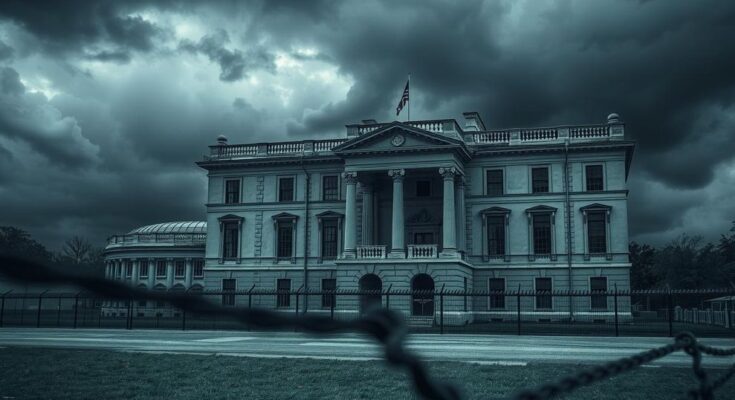Venezuelan President Nicolás Maduro’s regime has besieged a mansion sheltering five political prisoners, allies of María Corina Machado. Facing severe restrictions and threats from armed forces, the prisoners remain unwilling to surrender. Diplomatic efforts for their safe passage have stalled as U.S. policy towards Venezuela oscillates. The situation raises complex issues around asylum, safety, and the Maduro government’s aggressive tactics against political dissidents.
For a year, the Venezuelan government, led by President Nicolás Maduro, has laid siege to a mansion in eastern Caracas housing five political prisoners. This location includes the Argentine Embassy, surrounded by armed security forces that have threatened entry multiple times. Since November, the embassy’s power supply has been severed and food deliveries have been restricted. Among the prisoners are five key allies of opposition leader María Corina Machado, who previously attempted to challenge Maduro’s authority.
The five, accused of treason by the government, have remained inside the embassy without yielding to eviction. Their situation escalated after Maduro’s controversial re-election, which led to a crackdown on dissent and mass detentions. They effectively inhabit the embassy alone, following the expulsion of Argentine diplomats and local staff who feared for their safety. Brazil has offered to mediate for the five’s requests but negotiations for their departure remain stalled.
Pedro Urruchurtu, an adviser for international affairs to Machado, expressed the emotional turmoil of their situation, remarking on the difficulty of maintaining morale. Benigno Alarcón of Andrés Bello Catholic University noted that the government uses the siege strategically against Machado. The government denied any siege and Interior Minister Diosdado Cabello labeled these claims as mere “charades.”
The international political climate surrounding the conflict remains complicated. U.S. President Donald Trump’s administration has undergone shifts in policy regarding Venezuela, notably during an envoy meeting in January that initially suggested thawed relations. However, subsequent actions taken by the Trump administration, such as ceasing Chevron’s operations and deporting Venezuelans, indicate a conflict of priorities affecting stability in the nation.
During their imprisonment, Urruchurtu and fellow political prisoners have adapted to a regimented routine, engaging in reading, physical exercise, and maintaining surveillance over the mansion. They utilize a rudimentary alarm system to guard against government encroachment and share limited provisions. Their survival relies on canned goods — quantities preserved from earlier stockage, and they have attempted to procure fresh supplies, although delivery attempts have been fraught with complications due to arrests.
Historically, Venezuelan opposition leaders have sought refuge in embassies to escape persecution. However, the current regime has aggressively pursued their political exiles, contravening diplomatic norms. Initial arrangements for asylum turned contentious as the government accused opposition aides of aiming for asylum routes instead of complying with migration protocols.
Some reports indicate Brazil is prepared to arrange extraction via a military aircraft, yet efforts to initiate a diplomatic resolution in February failed. The five are open to leaving but insist any resolution aligns with international law, despite Cabello’s provocative threats. In their isolation, they ponder their precarious fate, reflecting on the nature of their entrapment within what they describe as a hostage situation, expressive of hope yet fraught with anxiety over what lies ahead.
The ongoing stand-off between the Maduro regime and the five political prisoners highlights the complex dynamics of Venezuelan politics and international relations. The embattled opposition figures continue to endure significant hardships while seeking a diplomatic escape. As negotiations remain stalled and external political pressures fluctuate, the uncertainty surrounding their fates persists, posing substantial challenges both for the opposition and Venezuelan citizens seeking stability. This situation underscores the delicate nature of political asylum and the lengths to which regimes may go to suppress dissent.
Original Source: www.batimes.com.ar




